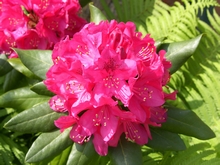Rhododendron: Nepal's Floral Emblem - The True "Flower of the Heights"
June 19, 2017

Hello again, Naho here. Did you know that August 11 is this year's "Mountain's Day" in Japan?
In Fact, Nepal's floral emblem rhododendrons are known as the "flower of the mountains" among local hikers .
Said to be the origin of the Japanese expression "flower of the heights" ("Takane no hana," often used to describe a prize beyond one's reach, an unattainable object, etc.), rhododendrons are also flowers of unexpected secrets.
Nepal's National Color: the Rhododendron Red
In Japan, rhododendrons are often grown in luxurious apartments and house gardens. With their showy, gorgeous blossoms, rhododendrons are sometimes called the "Queen of flowers," and adored by many.
Although rhododendrons grow in multiple colors such as pink, white and yellow, the type that was designated to be Nepal's national flower is the red variation called the "laliguras." To Nepali people, the red color evokes such strong feelings that it is used on their national flag. In Nepal, one can also see airplanes, sports team uniforms, etc., painted in red.
The fluttering petals of a rhododendron resemble the frills of a dress. Although the flower looks gorgeous, it can sometimes seem very distant, almost too lofty to approach. This is also said to be where the Japanese expression of "the flower of the heights" came from.
Home to the Rhododendron: The Mountains of Nepal
Rhododendrons are a flower familiar to Nepali hikers. The Ghorepani trek in March is a splendor with various rhododendrons in full bloom, and it seems that a lot of hikers would go there during that time of the year just for the view of the flowers.
As a flowering plant, the well-proportioned rhododendron is relatively easy to grow. However, the flower is also delicate in the sense that lengthened exposure to direct sunlight and high temperature with little moisture will cause it to wither and dry up. Some say that the Nepali mountains in March provide the best conditions and an unparalleled environment for rhododendrons to grow.
While completing the trek, one can enjoy the view of a diversity of plants including rhododendrons, as well as the vast countryside landscape of the Nepali villages at the foot of the Himalayas. The Ghorepani Poon Hill trek can be combined with various tours, and is a recommended route because it's much less likely to get mountain sickness there. If you happen to find yourself in Nepal during that season, the Ghorepani trek is definitely a must-visit.
Caution! Rhododendron Leaves are Highly Toxic
Rhododendrons are called "shakunage" in Japanese. In fact, a toxic substance, "rhodotoxin," is found in rhododendron leaves which, if consumed, could lead to nausea and difficulty in breathing. Therefore, it is very dangerous not treating rhododendrons with caution.
That might be the reason why, in floriography, the rhododendron has meanings of dignity, warning and solemnity - words that one normally finds very hard to associate with such a gorgeous flower. So if you happen to find a beautiful rhododendron while hiking, do not by any means put it in your mouth!
Related Services
To Contact Us Regarding Our Translation Services
For urgent needs, call:
+81-3-5730-6133
